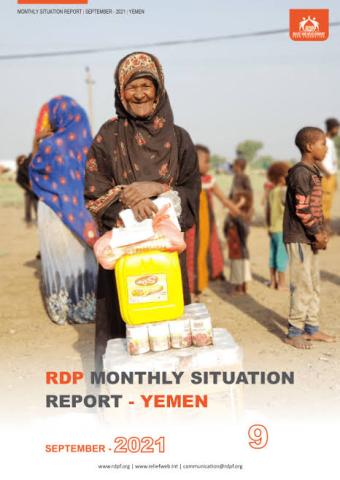Hidden scars: mentally ill patients lost in Yemen’s war


Radhwan Ali Hassan lives with his mother in a small house perched at the top of a sleepy Yemeni village called Aqeeqah, on the outskirts of Taiz city. From inside his bare-walled room, the 35-year-old hears the distant sound of an ice-cream van. He sees children running past his window and can smell goats, but he cannot remember the last time he walked outside.
Thick metal shackles around his ankles are attached to a heavy chain fastened to the far wall. They clatter as Hassan paces his room, rocks from side to side and smiles vacantly. His pupils are wide, his movements slow.
We forced him to wear clothes today. Usually he’s naked, just lying here,” says his mother, Hos Ansayeed. “Sometimes he gets very angry with me. He doesn’t want to see my face when he’s in a bad way. So I just leave his food at the door without coming in.”
The family do not know what triggered his condition, or what illness he struggles with – he has never been diagnosed. The cost of transport and the consultation fee to visit the nearest psychiatrist are not affordable options. Yemen’s six-year war has driven up prices of fuel and basic goods, leaving families such as Radhwan’s in desperate poverty. They spend everything they have fending off hunger or paying for Radhwan’s tranquillisers, which control his most violent outbursts.
Months after President Joe Biden promised to end US support for Yemen’s war, the world’s worst humanitarian crisis continues to deteriorate. Fuelled by a bitter Saudi-Iranian rivalry, the conflict has rendered two-thirds of the country dependent on aid to survive. More than 2 million children are expected to go hungry or starve this year. With the rebel Houthis stepping up their attack on the city of Marib, tens of thousands of people have been uprooted from their homes in the past few months alone.
With no end in sight, an entire population is struggling to cope. According to the World Health Organization, a fifth of those living in war zones are likely to be suffering from some form of mental disorder, including depression, post-traumatic stress disorder (PTSD), or psychosis. In Yemen, where soaring poverty rates have added to trauma and the healthcare system has been targeted, depleted and neglected, that figure is likely to be higher.
Data is limited, but from 2014 to 2015 there was a reported 40% increase in suicides recorded in Yemen’s capital, Sana’a. And in one of the few scientific studies on mental health carried out, nearly 80% of children surveyed in 2018 showed symptoms of PTSD.
At the Taiz mental health hospital, one of four public psychiatric facilities in the country, patients fare little better than at home. Just two nurses are responsible for 143 severely ill inpatients. Many are shackled to stop them escaping and almost all are heavily sedated, roaming through the corridors in a haze of consciousness.
Several male patients seemed confused at the sight of a visitor coming through the double-bolted metal gates and into the hospital’s main courtyard. Their grey tracksuits smell of urine. One thin man in his 30s saw his father shot dead in front of him. He has barely uttered a word since then.
Another patient in his mid-20s shuffled over to ask for a cigarette. His hand jutted out at a 90-degree angle as he took one, before he crumpled back down on the dusty ground, a grin on his face. Dr Adel Mulhi, who has been here since 2003 and is now the hospital’s director, says his patient was shot in the arm five years ago but when his parents could not afford the treatment he needed then he had gradually slipped into a deep depression. He had been brought to the hospital a year ago and had not seen his family since.
“For lots of people, the stigma controls their outcome,” says Mulhi. “If you are mentally not well, people will feel you are weak, or you’re not good at religion, or it’s from the devil. Our society doesn’t believe in [being] mentally ill.”
This cultural factor combined with the extreme stresses of war is why, Mulhi believes, so many family members end up locking away their loved ones or bringing them to the centre. “They just want to get rid of them. It’s very sad.”
Mulhi knows each of his patients by name and pats them on their heads affectionately, handing out words of encouragement as he strolls past their rooms.
Psychiatric specialists such as Mulhi have become rarer, many leaving for less stressful, safer environments. About 40 remain in Yemen today to serve a population of 30 million. Women often go untreated, their psychological suffering ignored entirely. Many seek out unqualified opinions or try whatever unproven treatment they can find. Several villagers in Aqeeqah said they had paid thousands of Yemeni rials to treat mentally ill family members with electric shock therapy, only to discover that it worsened their condition.

Yemeni officials on Monday condemned arrests and prosecutions by the Iran-backed Houthi militia directed against media, journalists and celebrities…

Yemen's warring parties are gearing up for new waves of conflict in 2023 amid a lack of decisive steps towards sustainable peace, adding to the suf…

The UAE will help to recruit doctors and deliver crucial supplies for hospitals in Yemen under a major healthcare drive. The Khalifa bin…